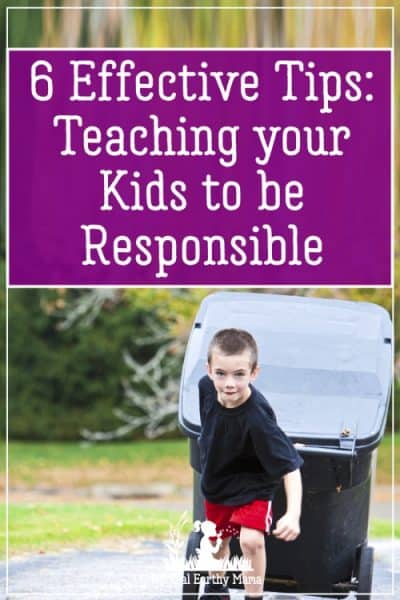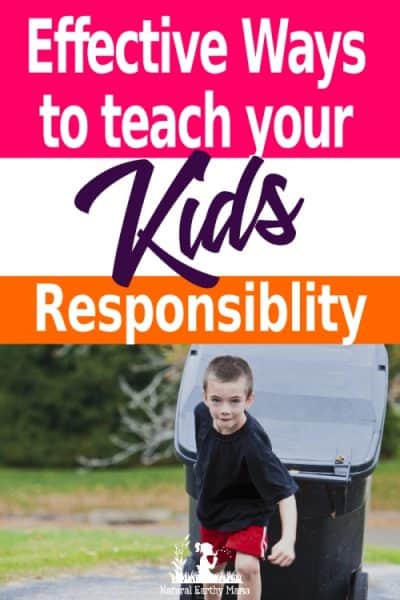 Responsibility isn’t genetic and has to be taught. Sadly it is not something you can simply inherit. Teaching your kids to be responsible is a life long process, but these tips on doing it successfully will help make it easier for you!
Responsibility isn’t genetic and has to be taught. Sadly it is not something you can simply inherit. Teaching your kids to be responsible is a life long process, but these tips on doing it successfully will help make it easier for you!
It’s important to set the right tone with your children from a young age in expecting them to be responsible.
Please read: This information is provided for educational purposes only and is not intended to treat, diagnose or prevent any disease. We encourage you to make your own health care decisions in partnership with a qualified health care professional.
This post contains affiliate links, this means at no extra cost to you, we make a commission from sales. Please read
our Disclosure Statement
Otherwise, children can start to slip in to irresponsible habits and ways of thinking.
As long as you’re committed and willing to implement the right actions, you will teach your children how to be responsible in the right manner, with love, gentleness and support.
Here are some of the most important tips to focus on as a parent when teaching your children to be responsible
1) Lead the Way
Leading the way is one of the first steps a parent should take with their children in all things, but especially when it comes to teaching and role modeling responsibility.
For example, let’s assume it’s time to wash the dishes. You should be willing to take the initiative and not leave them unwashed.
You should be willing to get to it right away as this shows your children that leaving them isn’t the best choice, and choosing to do your chores before relaxing is the best way to make sure everything gets done.
In most cases, children are going to pick up on these details and will implement them throughout their life without any formal discussions around it.
RELATED: 25 questions to get to know your child better
2) Build a Routine
Children need routines. Routines are safe, they are predictable and they form a boundary and structure to your days and weeks.
A good routine can be something as simple as doing their homework at a set time during the day, washing the dishes after dinner, or even sitting down with the family at a certain point in the day.
Children find routines reassuring and help manage both their, and your expectations on how the family’s time is spent.
3) Praise Them
Your praise is going to mean a lot to your child and you have to be willing to shower them with love and kind words.
This is a good way to show them that their ability to stay responsible is wanted and needed in the family.
If they do something that’s good (i.e. do their homework on time), it should come with praise from you. It doesn’t have to be over the top, something as simple as “well done” or “I bet it feels better to have that finished” is perfect.
The small encouragements day to day is the best way to teach them about responsibility and why it’s such an important part of their life.
RELATED: 50 ways to simplify your life

4) Get Them Involved
You want to encourage participation. Living in a family is a team sport. We all have a role to play, and none of us want to have to do everything.
Like a team sport, if everyone pitches in and does their part, the whole family wins.
This can be something as simple as hosing down the side of the car after you’ve scrubbed it with shampoo. Or them drying the dishes as you wash them.
You want them to participate in the little things that matter most. This is going to help them understand why being responsible is key and what role they can play around the house.
Over time, they will start to pick up on these patterns and do things on their own.
RELATED: Important parenting skills
5) Don’t Expect Perfection
Let’s assume your child makes their bed for the first time and the sheets are uneven. This is okay and shouldn’t be the end of the world as a parent!
How often my children have “washed the windows” and left them worse than when they started!
You have to realize it’s the intention that counts. They are still children at the end of the day, a 3 year old is very unlikely to do a good job of cleaning windows – especially seeing as he only reaches halfway!
You have to be willing to work with them as a parent and ensure they continue to put in the effort. Encourage them for what they have done, and help them with the tricky bits without saying “you can’t do this” or “look you made it worse”.
Over time, they will be able to fix the imperfections and get better at their responsibilities. Remember, it’s all about the intention to help when they are young.
6) Don’t Use Traditional Rewards
Traditional rewards (i.e. buying candy, ice cream) may work in other situations but shouldn’t factor into being responsible.
In general, being responsible is the bare minimum as a human being and shouldn’t be integrated into a reward-based system.
A child should expect a treat every time they act responsibly, it should be expected that as part of this family, they do their chores.
It should be assumed as another part of their life and not something that has to be rewarded. I don’t reward my kids for brushing their teeth, why should I reward them for feeding their own cat?
Of course, you can praise them and that is always recommended but it’s important to keep traditional rewards out of the picture. It is only going to make things complicated down the road when they don’t receive rewards in the real world.
In our house you don’t get paid pocket money for doing what is expected, that is just your role as part of the family and as a pet owner. I don’t get paid to vacuum, do laundry or cook dinner, I am not paying you for it either.
If my children want to earn pocket money, they can come to me with an idea and we can work on it together – be it a business proposition, or a task that needs done around the house that isn’t part of their everyday responsibilities.
This is a great way to develop business minded entrepreneurs and producers not consumers, and I strongly encourage you to consider it.
I got that concept from Joel Salatin and his parenting philosophy
Final Thoughts on Teaching Children to be Responsible
With this advice, you are going to be on the right path towards raising responsible children. Yes, it is going to be a challenge at times but the journey can be a rewarding one for parents and their young children. Stick to the plan, implement these tips, and know you are helping your child become a better person.
